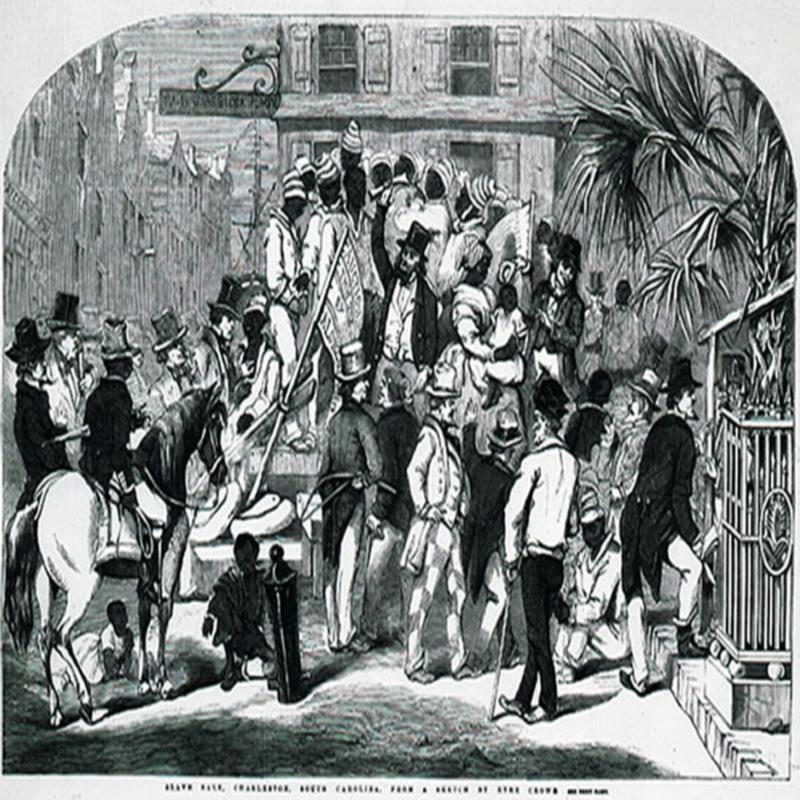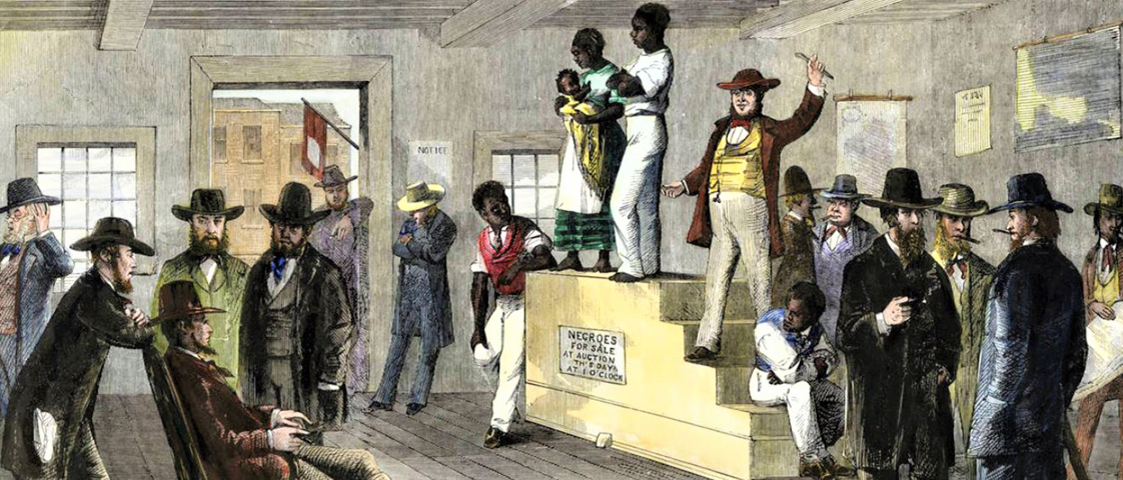The Great Slave Auction
Posted on 26th January 2021
The Great Slave Auction that took place in Savannah, Georgia in early March 1859, was the largest of its kind and the last in the United States prior to the Civil War and eventual black emancipation. The 436 slaves available for purchase came from the estates of Pierce Mease Butler, a reckless and foolish man by all accounts who was desperate to settle his gambling and business debts.
In the days immediately prior to the sale the slaves were gathered in the stables at the Ten Broeck Racecourse for inspection. It was stipulated that family groups, husband, wife and children were not to be broken up and sold separately though how strictly this was adhered to after purchase remains unknown.
The auction was a success, and he raised some $303,000 or almost $7,000,000 in today’s money to pay off his mostly Northern creditors. But he had in fact been a little hasty, had he delayed for a year then the war, between the States would have effectively wiped out his debt. But he was at least able to retain ownership of his Plantations after the war even if he struggled to make them profitable again.
This is a report on the Great Slave Auction as it appeared in the New York Tribune the week after its conclusion. It was written by Mortimer Thompson who had been sent by the Tribune’s abolitionist editor Horace Greely to pose as a potential buyer to uncover the true iniquities that underscored the trade in human lives.

The slaves remained at the racecourse, some of them for more than a week and all of them for four days before the sale. They were brought in thus early that buyers who desired to inspect them might enjoy that privilege, although none of them were sold at private sale. For these preliminary days their shed was constantly visited by speculators. The negroes were examined with as little consideration as if they had been brutes indeed; the buyers pulling their mouths open to see their teeth, pinching their limbs to find how muscular they were, walking them up and down to detect any signs of lameness, making them stoop and bend in different ways that they might be certain there was no concealed rupture or wound or; and in addition to all this treatment, asking them scores of questions relative to their qualifications and accomplishments.”
All these humiliations were submitted to without a murmur and in some instances with good-natured cheerfulness - where the slave liked the appearance of the proposed buyer and fancied that he might prove a kind 'mas'r.'
The following curiously sad scene is the type of a score of others that were there enacted:
'Elisha,' chattel No. 5 in the catalogue, had taken a fancy to a benevolent looking middle-aged gentleman, who was inspecting the stock, and thus used his powers of persuasion to induce the benevolent man to purchase him, with his wife, boy and girl, Molly, Israel and Sevanda, chattels Nos. 6, 7 and 8. The earnestness with which the poor fellow pressed his suit, knowing, as he did, that perhaps the happiness of his whole life depended on his success, was interesting, and the arguments he used were most pathetic. He made no appeal to the feelings of the buyer; he rested no hope on his charity and kindness, but only strove to show how well worth his dollars were the bone and blood he was entreating him to buy.
'Look at me, Mas'r; am prime rice planter; sho' you won't find a better man den me; no better on de whole plantation; not a bit old yet; do mo' work den ever; do carpenter work, too, little; better buy me, Mas'r; I'se be good sarvant, Mas'r. Molly, too, my wife, Sa, fus rate rice hand; mos as good as me. Stan' out yer, Molly, and let the gen'lm'n see.'
Molly advances, with her hands crossed on her bosom, and makes a quick short curtsy, and stands mute, looking appealingly in the benevolent man's face. But Elisha talks all the faster.
'Show mas'r yer arm Molly - good arm dat mas'r - she do a heap of work mo' with dat arm yet. Let good mas'r see yer teeth Molly - see dat mas'r, teeth all reg'lar, all good - she'm young gal yet. Come out yer Israel, walk aroun' an' let the gen'lm'n see how spry you be.'
Then, pointing to the three-year-old girl who stood with her chubby hand to her mouth, holding on to her mother's dress, and uncertain what to make of the strange scene.
'Little Vardy's on'y a chile yet; make prime gal by-and-by. Better buy us mas'r, we'm fus' rate bargain" - and so on. But the benevolent gentleman found where he could drive a closer bargain, and so bought somebody else...
"The buyers, who were present to the number of about two hundred, clustered around the platform; while the Negroes, who were not likely to be immediately wanted, gathered into sad groups in the background to watch the progress of the selling in which they were so sorrowfully interested. The wind howled outside, and through the open side of the building the driving rain came pouring in; the bar down stairs ceased for a short time its brisk trade; the buyers lit fresh cigars, got ready their catalogues and pencils, and the first lot of human chattels are led upon the stand, not by a white man, but by a sleek mulatto, himself a slave, and who seems to regard the selling of his brethren, in which he so glibly assists, as a capital joke. It had been announced that the Negroes would be sold in "families," that is to say; a man would not be parted from his wife, or a mother from a very young child. There is perhaps as much policy as humanity in this arrangement, for thereby many aged and unserviceable people are disposed of who otherwise would not find a ready sale...
The expression on the faces of all who stepped on the block was always the same, and told of more anguish than it is in the power of words to express. Blighted homes, crushed hopes and broken hearts was (sic) the sad story to be read in all the anxious faces. Some of them regarded the sale with perfect indifference, never making a motion save to turn from one side to the other at the word of the dapper Mr. Bryan, that all the crowd might have a fair view of their proportions, and then, when the sale was accomplished, stepping down from the block without caring to cast even a look at the buyer, who now held all their happiness in
his hands. Others, again, strained their eyes with eager glances from one buyer to another as the bidding went on, trying with earnest attention to follow the rapid voice of the auctioneer. Sometimes, two persons only would be bidding for the same chattel, all the others having resigned the contest, and then the poor creature on the block, conceiving an instantaneous preference for one of the buyers over the other, would regard the rivalry with the interest, the expression of his face changing with every bid, settling into a half smile of joy if the favorite buyer persevered unto the end and secured the property, and settling down into a look of hopeless despair if the other won the victory...
The auctioneer brought up Joshua’s Molly and family. He announced that Molly insisted that she was lame in her left foot, and perversely would walk lame, although, for his part, he did not believe a word of it. He had caused her to be examined by an eminent physician in Savannah, which medical light had declared that Joshua's Molly was not lame, but was only shamming. However, the gentlemen must judge for themselves and bid accordingly. So Molly was put through her paces, and compelled to trot up and down along the stage, to go up and down the steps, and to exercise her feet in various ways, but always with the same result, the left foot would be lame. She was finally sold for $695.
Whether she really was lame or not, no one knows but herself, but it must be remembered that to a slave a lameness, or anything that decreases his market value, is a thing to be rejoiced over. A man in the prime of life, worth $1,600 or thereabouts, can have little hope of ever being able, by any little savings of his own, to purchase his liberty. But, let him have a rupture, or lose a limb, or sustain any other injury that renders him of much less service to his owner, and reduces his value to $300 or $400, and he may hope to accumulate that sum, and eventually to purchase his liberty. Freedom without health is infinitely sweeter than health without freedom.
And so the Great Sale went on for two long days, during which time there were sold 429 men, women and children. There were 436 announced to be sold, but a few were detained on the plantations by sickness...
Tagged as: Fact File
Share this post:





